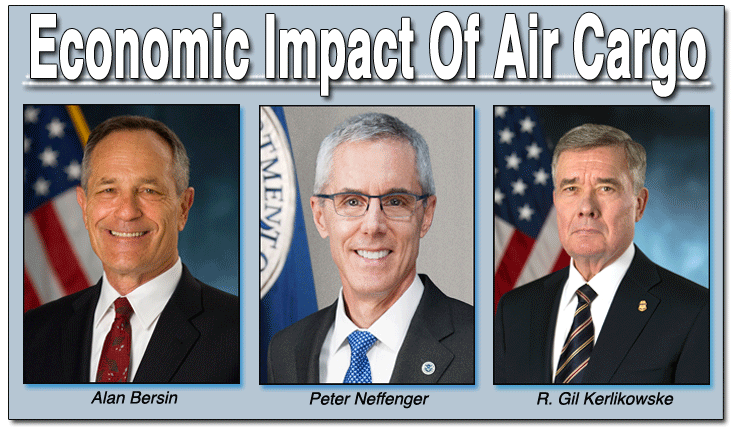 |
One
of our industry’s significant shortcomings is
that most people outside of the industry do not give
much thought to the many lifestyle and economic benefits
air cargo delivers and facilitates for their daily lives.
In times of crises when
a child or loved one is critically ill and needs specialized
medication, the expectation is that it will be either
instantly available or will be sourced and available
the next day at the latest.
The same holds true for
those last-minute gifts we buy and expect to be delivered
overnight, the last-minute flowers we buy on Valentine’s
Day for our loved ones, and the availability of our
precious digital devices, without which we are lost—both
from a professional and personal perspective. The immediacy
and ubiquity has become commonplace with very little
or no thought given to what makes it all possible.
The air cargo backbone
facilitating fulfillment of many of these needs has
become an invisible network that is taken for granted
by most.
The same holds true for
many government officials who fail to make the connection
between their country’s economic prosperity and
the many complex activities involved in the air cargo
value chain that help to fuel this machine. The result
is the development of unnecessary or counterproductive
policies and regulations that at times inadvertently
impede the development and sustainable growth of a sector
so vital to the very same objectives they are ultimately
pursuing—namely sustainable national and global
economic growth and prosperity.
However, there is a ray
of hope. At a recent meeting in Shanghai, the G20 Trade
Ministers launched the World
Trade Outlook Indicator. This indicator prominently
features airfreight as a key driver. The G20 policymakers
clearly understand the importance of our industry and
are looking to airfreight as one of the key contributors
to the health of global trade. As noted in their methodology
paper, “Air freight has proven to be a very timely
indicator of world trade and an early signal of turning
points in economic activity.” This is an important
development that helps to highlight the critical importance
of our industry and should hopefully also help us to
enhance our policy dialogue with international bodies
such as the World Trade Organization (WTO), particularly
on issues like trade facilitation.
So how do we close the
gap between what is being done at the G20 leadership
level and the various government departments involved
in the air cargo value chain here in the United States?
Surely, if the G20 Heads of State recognize the importance
and impact of our industry on the global economy, the
same understanding should hold true here in the U.S.
As an industry we should relentlessly work towards closing
this gap. The key being continuous coordinated dialogue
at all levels across the various government departments
to ensure that our industry is viewed as a strategic
enabler, and the benefits air cargo delivers in the
United States are recognized and put at the forefront
of all decision-making.
This is one of the key
strategic drivers behind the launch of the U.S. Air
Cargo Industry Affairs Summit (USACIA). It’s a
powerful opportunity for us as a united industry to
drive this point home. With VIP speakers such as R.
Gil Kerlikowske,U.S. Customs and Border Protection (CBP)
Commissioner; Peter Neffenger, Administrator for the
U.S. Transportation Security Administration (TSA); and
Alan Bersin, Assistant Secretary for International Affairs
and Chief Diplomatic Officer for the U.S. Department
of Homeland (DHS), among others, it is important for
all industry players across the value chain to be present.
This is an amazing opportunity to interact with these
important government department heads to help them better
understand our business and ensure they are taking our
priorities and concerns into consideration.
 If there is one thing I am sure we are all aligned on,
it is this very point: the economic value and strategic
importance of air cargo as an enabler of economic prosperity
is unquestionable and needs to be prioritized as such
by government officials in the United States. We should
all unite around this cause. So please make sure you
join us in Washington, D.C., at the USACIA
Summit on October 4-5. Help us emphasize this important
point in order to secure the future prosperity of our
industry. Every voice counts, so be there and make a
difference!
If there is one thing I am sure we are all aligned on,
it is this very point: the economic value and strategic
importance of air cargo as an enabler of economic prosperity
is unquestionable and needs to be prioritized as such
by government officials in the United States. We should
all unite around this cause. So please make sure you
join us in Washington, D.C., at the USACIA
Summit on October 4-5. Help us emphasize this important
point in order to secure the future prosperity of our
industry. Every voice counts, so be there and make a
difference!
Remember, Air Cargo is
a force for good that makes it happen!
Lionel
Van Der Walt
President
Cargo Network Services
|




 Vol.
15 No. 71
Vol.
15 No. 71 Vol.
15 No. 72
Vol.
15 No. 72